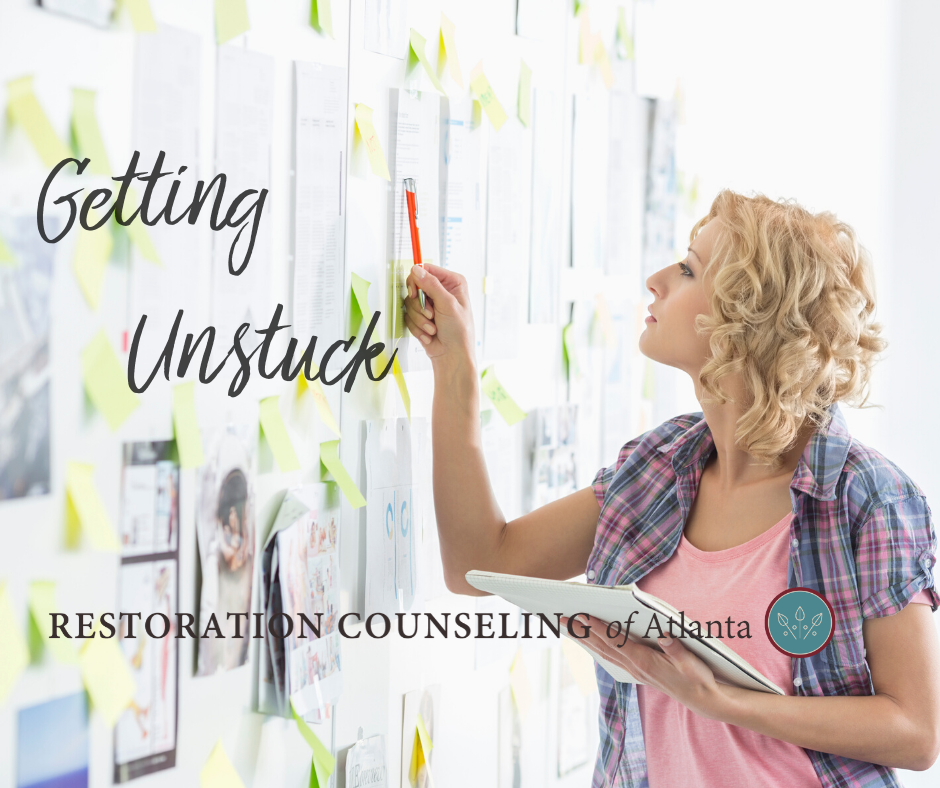Being stuck can be infuriating, especially when creating the life you desire demands action.
What happened?
Perhaps you are agonizing over a decision with no clear path. Maybe you feel weighed down by an overwhelming task at work that has an impending deadline. Or you had a conflict-ridden conversation with your teen. You know you need to revisit the situation and work on a resolution. Instead, you find that you are at a loss on how to pursue or accomplish a more favorable conversation.
Moments like these can put our stomach in knots with apprehension and dread. We can tend to drag our feet on difficult tasks, unclear decisions, and challenging conversations. We do this because there is the uncertainty of a favorable outcome. It is hard to risk stepping into the vulnerable wilderness of the unknown. We want to will ourselves to take action, and yet, if we could take that step, we would have already. Sheer willpower is not proving to be enough. We are stuck.
What do we do now?
These stuck moments can bring a tornado of frustration pointed at our inaction. We can vividly see that our procrastination is counterproductive. We know that if we continue to delay, we will fail to meet expectations, miss opportunities, or watch our relationships erode. In our angst for movement, we berate, shame, and cajole ourselves toward progress. While this may have been effective in the past, we all reach a point in life where this style of motivation has diminishing returns. It may even stall completely.
As we buckle underneath the weight of this anger turned inward, we can find ourselves plunging into a sea of despair and discouragement over the ways we disappoint ourselves. Sadly, this downward spiral only adds complications to an already difficult scenario.
So, what do we do when we find ourselves struggling and nothing seems to be working? Here are several tactics you can implement to find traction and forward momentum again.
Get a quick win
Build momentum and confidence through small actions and accomplishments. Identify one or two tasks that you could accomplish quickly and celebrate their completion even if that is listening to your voicemails or emptying your dishwasher.
Break down and tackle the most important
Decrease the sense of being overwhelmed by breaking down the task, decision, or conversation into smaller steps. Invite relationship into the action needed and collaboratively decide on ways to increase incentive around taking action.
Engage your body
Try taking a walk or spending 15 minutes stretching. Get a change of scenery by finding a beautiful location to work for the afternoon. Take 15 minutes to write a stream of consciousness expressing the hesitations and concerns with taking action. No editing or judging allowed. Enjoy a delicious meal, hot bath, or a massage to engage your senses, bring down your distress, and increase your brain’s capacity to problem solve.
Pursue connection
Call a trusted friend or mentor and share your unedited experience of being stuck. We often keep parts of our experience out of a relationship, and this keeps parts of us underdeveloped. We need to drag these parts of us into relationships and share the ways we are conflicted, uncertain, and hesitant. New York Times bestselling author of Boundaries, Dr. John Townsend, has compiled a list of specific needs we often are looking for in a relationship. I would encourage downloading this list so that in stuck moments you can identify your specific need and reach out to a willing friend for that particular relational nutrient.
Request input
Pursue an infusion of information in the stuck areas. Many times, we have a knowledge gap, and the confusion and uncertainty are signs we need help from outside resources. Read a book. Brainstorm with a colleague. Role-play the conversation with a therapist. Receive the input and adjust your planned action accordingly.
Practice these options and pay attention to what works for you. Additionally, a perspective shift can be helpful in the aftermath of taking action we have hesitated on. When we make hard decisions or take difficult actions, it is necessary to reflect back with kindness, celebration, and honesty. Here are a few steps to consider once the action has been taken:
Celebrate attempts
Facing the next hard step is a win in its own right. When we wrestle through a tough step, we can tend to dismiss the challenge with shaming expectations of not having struggled in the first place. Instead, seek to celebrate the exertion, acknowledge the intricacy that was navigated, and highlight the attempt as a win.
Practice noticing small shifts
Making the decision and giving your best attempt is movement regardless of the outcome. Examine the complexity of the scenario not noticed at first glance and practice finding the small shifts toward increased skill development that will build over time.
Evaluate to learn
Venturing into taking action in new frontiers or with new tools is fraught with missteps and mishaps. We must expect that outcomes will be not quite to the level we would prefer and that this is to be expected. This is an opportunity to evaluate new areas of our development and practice honing our skills for the next time.
We’ve all been there. Trying to find action in the midst of paralysis and indecision. These moments are normal especially as we stretch and grow. We need to expect these moments and begin to employ strategies that work for us. Over time, you will navigate these moments with increased skill and finesse.
Writte n by: Becca Cline, LPC
n by: Becca Cline, LPC
Roswell and Buckhead Locations
becca@restorationcounselingatl.com, ext. 156
Becca has received extensive training with Dr. John Townsend, New York Times best selling author of Boundaries and has completed training in his Competence + Character growth model. She is currently completing the Townsend Leadership Program, which focuses on achieving strategic goals to pursue improved performance personally and professionally.
Becca works with male and female clients who are 13 years or older. She sees couples, families, and individuals. Also, she has worked with clients dealing with a variety of issues including depression, anxiety, addiction, grief/loss, trauma, abuse, spiritual issues, sexuality, family of origin issues, codependency, anger, and interpersonal and relationship issues. In addition, Becca also has experience in running process groups.

